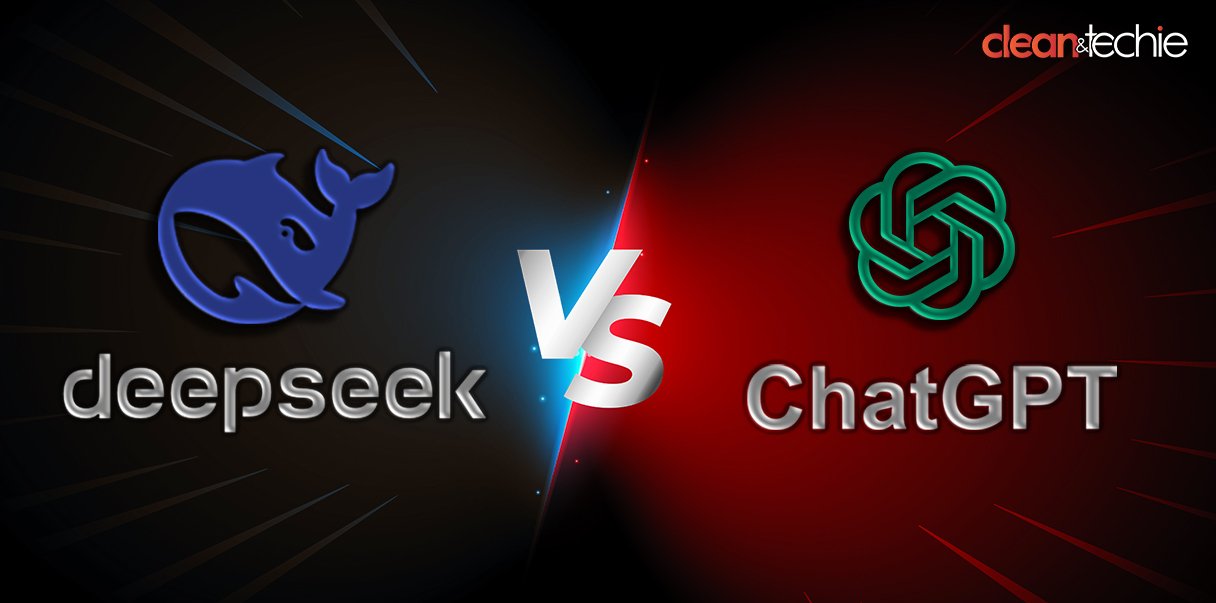Artificial intelligence is advancing at breakneck speed, with new models always challenging the conventional.
Among the newest competitors, DeepSeek is poised to challenge ChatGPT for some AI coffee mug handles, and a debate ensued. So how do they faired in accuracy, efficiencies, and real-world instances?
A comprehensive look into the pros and cons of each AI model, this deep dive will help you figure out which solution is right for what. Let’s break it down!
DeepSeek Vs. ChatGPT: Feature comparison
In this blog, let’s deep dive into the shared feature-level comparison of these two AI tools that matter most. You need to know this so he can help you pick the tool that best suits you.
1. Writing assistance
While both can aid the models in documentation and content production, they take different routes. With ChatGPT, the magic is impressing and explaining complex data issues to non-technical stakeholders, so it is good for rich context conversational content. DeepSeek, on the other hand, is most effective in technical writing situations as it generates tight, clear work that is especially useful for data project doc and spec development.
2. Coding and technical queries
This is by far the most important feature if you are a coder. With ChatGPT, this covering code assistance helps to offer a lot of elaborate details with every suggestion, which makes it particularly great for teaching newcomers your data science. While more grassroots, DeepSeek is for rapid code, and ChatGPT is for a deep understanding of even the most written, in turn, broken-down implementations.
3. Brainstorming & Creativity
During brainstorming of data projects and analytics strategies, the tools have built some different perspectives. It can also come in handy when the problem gets more solution-minded towards ChatGPT for differentiating multiple approaches and uncovering a lot of analytics possibilities. DeepSeek usually comes with much fewer but deeper solutions. Breaking a methodically structured approach—this is especially useful if you want to go deep on a single data strategy.
4. Learning and research
ChatGPT works great when you need to be working on tutorial-style explanations for learning new concepts in data science education. It is a pro at breaking complex things up into succinct, readable pieces. DeepSeek is especially good at the portmanteau simplicity of precision and conciseness, making it invaluable for reference and fact-checking while in the middle of your data projects. For a review of particular methodologies or algorithms, it is especially useful because of its technical accuracy.
5. Cost and efficiency
DeepSeek offers low cost by leveraging energy-efficient hardware and edge deployments in order to minimize operational expenses. As open source, it’s a great tool to use on projects with limited budgets. The subscription model for ChatGPT is more expensive but gives you reliable performance and neat features that are to be used in professional data work.
6. Privacy and ethical issues
This is especially critical when handling sensitive data. ChatGPT is in line with Western data privacy standards, so it is a more secure option for projects that demand stringent data privacy compliance. The data storage practice and content moderation policies of DeepSeek may be a cause for worry for some specific types of projects (especially those concerning sensitive matters or analytical discussions that should not be limited).
Every feature comparison shows trade-offs that are important for the different data science problems. So, the win is always about finding out these capabilities in line with your own specific needs and wants.
Key Differences Between DeepSeek and ChatGPT
| Feature | DeepSeek | ChatGPT |
| Training Data | Focused on logical reasoning, research-oriented texts | Trained on a mix of internet text, conversations, and creative content |
| Accuracy | Prioritizes factual correctness and logical consistency | Balances accuracy with conversational fluency |
| Creativity | More analytical, less creative | Excels in storytelling, writing, and creative content generation |
| Technical Skills | Strong in mathematical and logical problem-solving | Great for coding assistance and debugging |
| Conversational Ability | More structured, less engaging in casual conversation | Highly interactive and engaging |
| Use Cases | Research, problem-solving, and data analysis | Content creation, chatbots, customer support, education |
The Pros of DeepSeek
- Logical Accuracy: DeepSeek works strongly to provide very logical and right-on-the-money answers. Perfect for anyone who needs exact numbers, i.e., researchers, analysts, or INTELSAD engineers.
- Research-Focused: theoretically optimized for technical documents, academic papers, and data-based analysis
- Less Inaccurate Data: Less Misleading DeepSeek always warms up misinformation and speculative solutions, which means it is a trustworthy tool for professionals who need only specific portions of accuracy.
- Works Better for Data Analysis: Compared to much of other AI, it has the potential to consume, process, and analyze structured data more effectively than most models, useful in finance, healthcare, and business intelligence.
- For Experts: Professionals working in the most technical spaces—medicine, law, or engineering, for sure—can use DeepSeek for specific in-depth analytics as it strictly follows structured logical thinking.
- Strong Advanced Mathematical Abilities: DeepSeek excels in problem-solving complex mathematical problems, handy for students and professionals working with quantitative data.
- Purportedly consistent, Formal style: The model outputs in a formal tone that lends credibility to its responses, which could be used in academic and business applications.
The Pros Of ChatGPT
- Interactive and conversational: ChatGPT is made to generate informal discussion responses that can be used in customer service, personal assistants, and even AI chatbots.
- Good for Content: Best Content Creator The model is good at writing human-like text, so you can think of using it for bloggers, marketers, or just creative writers. It can create articles, social media posts, and even poetry and short stories.
- Coding Assistance: ChatGPT can code in its own right way, like constructing explanations and debugging code or even refactoring code chunks.
- Simple and accessible for everyone: given what we discussed earlier regarding the natural language processing of ChatGPT, it is easy enough to use. It is language and casual, which makes it easy to use more by non-experts.
- Storytelling capabilities: ChatGPT If you are looking to have the bot make you compelling narratives, write character profiles, or script an entire movie more creatively, then ChatGPT would be better for this.
- Versatility in Use Cases: Whether you use it for education, education, or ChatGPT is suited to many, making a more industry-flexible AI for general applications at scale.
- Emotional Intelligence: To provide services such as mental health chatbots appropriate, or customer service and virtual assistants, a chatgpt can simulate empathy and understanding.
- Sparks the imagination: it can come up with creative ideas, write marketing copy, and act as a muse for designers, advertisers, or content strategists.
Limitations of DeepSeek and ChatGPT
Although DeepSeek and ChatGPT are both very powerful in their own right, each also has shortcomings. DeepSeek just may not be as dependable without widespread adoption for mainstream applications.
As for ChatGPT, the old standby generates very blunt answers, suffers from contextual blindness in very specific areas, and is therefore not able to provide the most precise information (because of historical baggage bias).
Both models are constrained by real-time data access and high latency, which is not friendly to users with few machine resources.
What Model Should You Go For?
- For the fact-driven, analytical AI of research, DeepSeek is preferred
- If you need something conversational, creative, and reusable, then use the ChatGPT model!
- While all the models fare well for AI-assisted coding, ChatGPT is often preferred for debugging and explaining intricate programming concepts to a human.
- If you need AI-powered coding, then I guess this would be better suited for you if your work is more precision-oriented, and data-/logic-driven work probably may need DeepSeek over your head.
- ChatGPT is better suited to be a conversational agent that can keep natural, flowing dialog with users.
Real-World Applications
DeepSeek is a super useful tool for areas such as finance, healthcare, or academic research where precision and logic are fundamental. Scientists and statistics analysts can depend on its fact-based way for insightful results.
For example, financial analysts can conduct DeepSeek for large datasets and important trends, while healthcare personnel can use its analytic capacity to scan and decipher medical literature
However, contrary to that, ChatGPT has been in great demand also for marketing purposes, storytelling, and customer service. Convo is being used by many businesses to communicate with customers in a more organic (or at least less robotic) manner.
Content creators and marketers use ChatGPT or other methods, such as the script, to auto-generate pieces for the articles, countering that these are still high-quality outputs and time savers. Its responsive ability also makes it a natural for chatbots and interactive applications.
Final Verdict
DeepSeek and ChatGPT are both great models, but the best model will depend on your own requirements. From DeepSeek (precision and research) to ChatGPT (unbeatable in creative writing and just plain chatty.)
If you’re a researcher, writer, or developer, the model of AI to select will be dictated by where you want to take advantage of its strengths. As AI models get better in the future, a combined approach that leverages both the strengths of DeepSeek and ChatGPT may turn out to be the optimal solution for users who need both precision and conversational fluency.
For now, taking the right tool for your specific task is the holy grail of making your work as efficient and effective.




